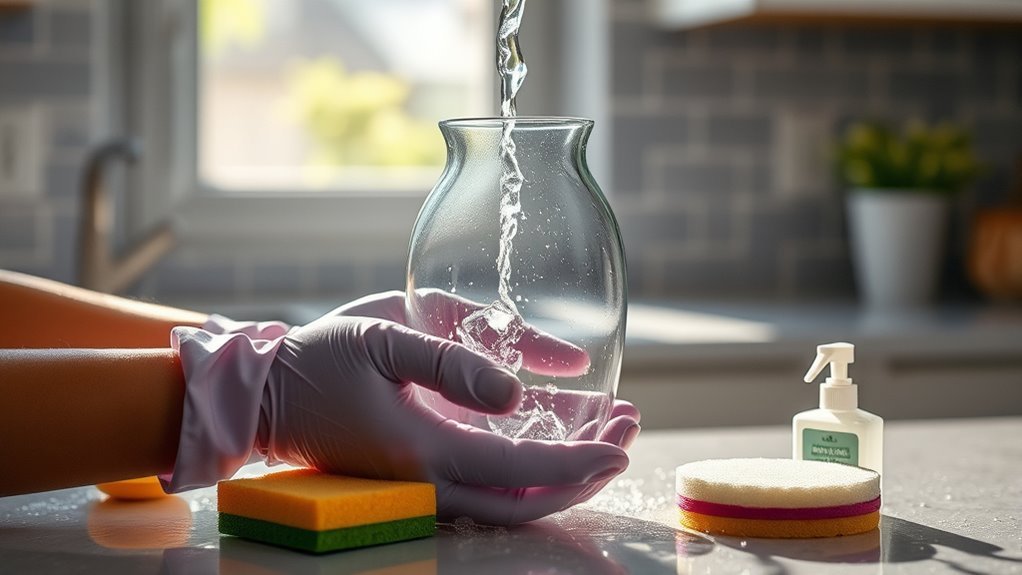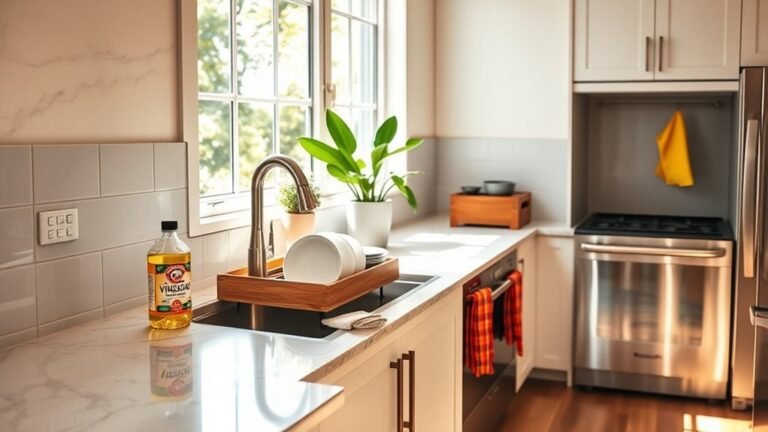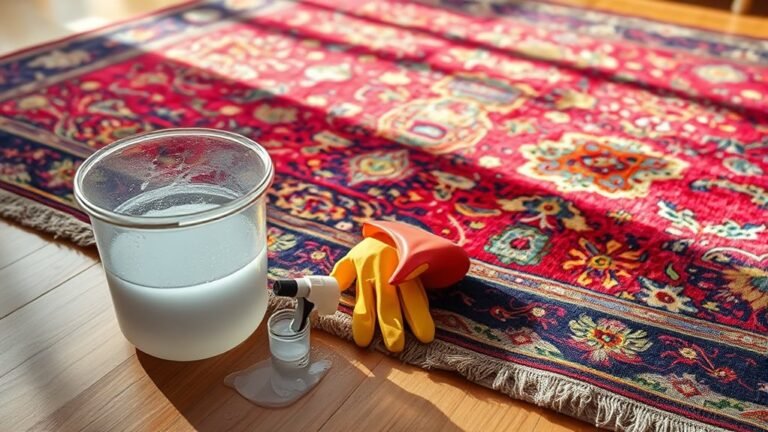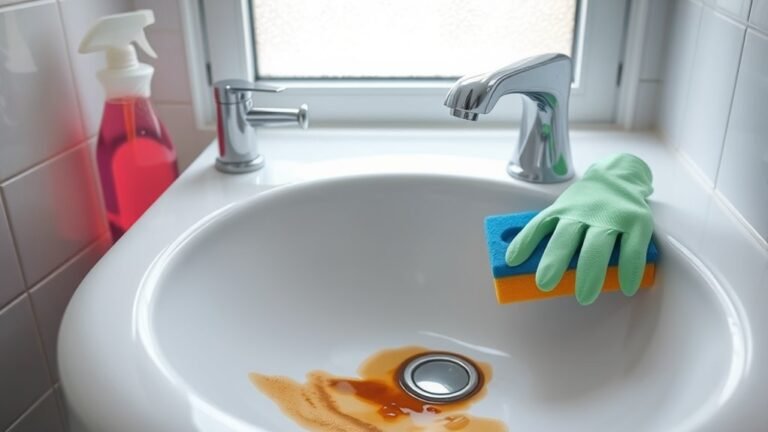Washing Glass Without Damage
To wash glass without damage, use soft microfiber or lint-free cotton cloths and avoid abrasive sponges or harsh chemicals that can scratch or dull the surface. Start with lukewarm water and gentle, natural cleaners like mild dish soap or a vinegar solution. Rinse thoroughly, then dry by blotting softly with a clean cloth to prevent streaks and water spots. Careful prep and gentle techniques protect your glass’s clarity and longevity. There’s more to learn on how to keep your glass spotless and scratch-free over time.
Choosing the Right Cleaning Materials

How do you guarantee your glass stays spotless without getting scratched or damaged? The key lies in choosing the right cleaning materials. Avoid abrasive sponges or rough cloths that can leave tiny scratches. Instead, opt for alternative materials like microfiber cloths or soft, lint-free cotton, which gently lift dirt without harming the surface. If you’re mindful of the environment, eco friendly options are widely available and just as effective. These include reusable cloths made from sustainable fibers and biodegradable cleaning pads. Steering clear of harsh chemicals also protects your glass and the planet. By selecting materials carefully, you maintain your glass’s clarity and extend its life, all while embracing freedom through responsible, damage-free cleaning practices. For best results, always use soft, lint-free cleaning cloths to prevent scratches and ensure a smooth cleaning experience.
Preparing the Glass for Washing
Once you’ve selected the right cleaning materials, the next step is to prepare the glass properly to avoid damage during washing. Begin with a thorough pre wash inspection to identify cracks, chips, or coatings that require special care. Next, perform glass type identification—knowing whether it’s tempered, laminated, or antique glass informs your approach and prevents damage.
| Step | Action | Purpose |
|---|---|---|
| 1 | Pre wash inspection | Detect vulnerabilities |
| 2 | Glass type identification | Tailor cleaning method |
| 3 | Remove loose debris | Prevent scratches |
| 4 | Choose appropriate water temp | Avoid thermal shock |
| 5 | Prepare soft cloths/sponge | Protect surface integrity |
Using microfiber cloths and soft mops during preparation helps avoid scratches and maintain the glass’s clarity. This careful preparation guarantees your glass remains intact and pristine, granting you the freedom to clean confidently.
Gentle Washing Techniques

When washing glass, you should always use lukewarm water to prevent thermal shock. Choosing a soft cloth is essential to avoid scratches during cleaning. Also, steer clear of harsh chemicals that can damage the glass surface. Using a microfiber cloth helps trap dirt effectively and prevents streaks for a spotless finish.
Use Lukewarm Water
Although it might be tempting to use hot water for a thorough clean, lukewarm water is essential to prevent damage to delicate glass surfaces. The temperature impact on glass can cause cracks or weakening if the water is too hot or cold. Choosing the right water type means balancing effective cleaning with safety.
| Water Temperature | Effect on Glass |
|---|---|
| Hot (>50°C) | Risk of thermal shock |
| Lukewarm (30-40°C) | Gentle, safe cleaning |
| Cold (<20°C) | Potential stress cracks |
Using lukewarm water reduces sudden temperature changes that compromise glass integrity. It allows you freedom to clean confidently, protecting your glassware without sacrificing cleanliness. Always prioritize water type and temperature impact to maintain your glass’s pristine condition.
Soft Cloth Selection
Because the right cloth can make all the difference, selecting a soft, non-abrasive material is essential for washing glass without causing scratches or damage. You’ll want to weigh options for materials that combine gentle care with effective cleaning. Microfiber benefits include superior lint-free wiping and enhanced absorbency, making it a top choice. However, cotton alternatives can also work well if they’re soft and tightly woven. When choosing your cloth, keep these points in mind:
- Opt for microfiber for its durability and efficient dust trapping.
- Choose cotton alternatives only if they’re soft and free of rough fibers.
- Avoid abrasive or coarse fabrics that may scratch the glass surface.
- Use clean cloths to prevent dirt particles from causing micro-scratches.
This cautious approach lets you clean confidently while preserving glass clarity and freedom from damage.
Avoid Harsh Chemicals
Selecting the right cloth is just one part of protecting your glass during cleaning. Equally important is avoiding harsh chemicals that can damage surfaces or leave residues. Instead, opt for natural alternatives like diluted vinegar or mild soap solutions, which effectively clean without compromising the glass’s integrity. These eco-friendly solutions not only safeguard your glass but also reduce environmental impact, aligning with your desire for freedom from harmful substances. Harsh detergents and ammonia-based cleaners might seem effective, but they can cause etching or cloudiness over time. By choosing gentle, natural ingredients, you maintain clarity and extend the lifespan of your glassware. Always test any solution on a small area first, verifying it’s safe before proceeding. This cautious approach guarantees your glass stays pristine without sacrificing eco-conscious values.
Safe Drying Methods for Glass

When drying glass, you need to handle it carefully to prevent scratches and water spots. Using the right techniques allows you to maintain clarity and freedom from damage.
- Use soft microfiber cloths to gently blot moisture, avoiding abrasive fabrics that could scratch surfaces.
- Opt for air drying when possible; place the glass in a dust-free area to minimize water spots.
- Avoid excessive rubbing, which can lead to fine scratches or leave streaks.
- If drying by hand, use light pressure and a consistent motion to guarantee even drying without harm.
- Incorporating microfiber cloths helps trap dirt and minimize streaks for a clearer finish.
Removing Stubborn Stains Without Scratching
Even with careful drying, stubborn stains can remain on your glass, requiring special attention to remove them without causing damage. To maintain freedom from scratches, use gentle, non-abrasive methods. Avoid harsh scrubbing and opt for soft cloths or sponges with mild cleaning agents. Here’s a quick reference for effective stain removal and scratch prevention:
| Stain Type | Recommended Cleaner | Application Tip |
|---|---|---|
| Mineral Deposits | Vinegar solution | Soak and wipe gently |
| Fingerprints | Mild detergent and water | Use microfiber cloth |
| Grease | Dish soap diluted in warm water | Light circular motions |
Regularly swapping out cleaning cloths ensures you avoid spreading dirt and potential scratches, keeping your glass pristine and clear. This practice supports effective cleaning techniques for maintaining spotless surfaces.
Avoiding Common Mistakes When Cleaning Glass
When cleaning glass, you should always use soft cloths to prevent scratches and avoid abrasive damage. Choosing gentle cleaners is essential to protect the surface and maintain clarity. Steering clear of harsh chemicals and rough materials will help you keep your glass spotless without harm. Avoid cleaning windows in direct sunlight to prevent streaks caused by rapid drying and heat.
Use Soft Cloths
A soft cloth is vital for cleaning glass without causing scratches or streaks. Choosing the right material helps maintain the glass’s clarity and your freedom from constant rewashing. Microfiber cloths and cotton towels are excellent options because they trap dust and absorb moisture gently.
Here’s how to use soft cloths effectively:
- Always opt for clean, lint-free microfiber cloths or soft cotton towels.
- Avoid using rough fabrics or paper towels that can scratch or leave fibers behind.
- Gently wipe in circular motions to prevent streaks and guarantee even cleaning.
- Wash microfiber cloths regularly without fabric softener to keep them effective.
Choose Gentle Cleaners
Although it might be tempting to reach for strong chemicals, you should always choose gentle cleaners to protect your glass from damage. Harsh substances can etch or dull glass surfaces, limiting your freedom to enjoy crystal-clear views. Instead, opt for natural alternatives and eco friendly solutions that clean effectively without risk.
| Cleaner Type | Benefits | Emotional Impact |
|---|---|---|
| Vinegar Solution | Natural, affordable | Peace of mind |
| Mild Dish Soap | Gentle, effective | Confidence in care |
| Baking Soda Paste | Non-toxic, versatile | Empowerment |
| Commercial Eco Spray | Safe, biodegradable | Responsibility |
| Water + Microfiber | Chemical-free, reusable | Freedom from worry |
Choosing gentle cleaners preserves your glass’s clarity and your environment’s health.
Maintaining Glass Shine Over Time
Since glass surfaces are prone to accumulating dust and fingerprints, you’ll need to adopt a consistent cleaning routine to preserve their shine. Effective glass maintenance guarantees that your surfaces maintain clarity without damage. Focus on these key practices for shine preservation:
- Clean regularly with a gentle, ammonia-free solution to avoid residue buildup.
- Use a microfiber cloth for wiping to prevent scratches and enhance gloss.
- Avoid harsh chemicals or abrasive tools that can dull the surface over time.
- Dry the glass immediately after cleaning to prevent water spots and streaks. Incorporating essential oils into your cleaning routine can naturally enhance shine while providing antibacterial benefits.
Frequently Asked Questions
Can I Use Vinegar on All Types of Glass?
You can use vinegar on many glass types due to its vinegar benefits like removing grime and streaks effectively. However, you should be cautious because some specialty glass, like stained or coated glass, might react poorly. It’s best to test a small area first to avoid damage. So, while vinegar is versatile, not all glass types handle it well, and you should always prioritize preserving your freedom to clean safely without risking harm.
How Often Should I Wash Glass Items to Prevent Damage?
You should follow frequency guidelines based on how often you use your glass items and their purpose. For everyday glassware, washing after each use prevents buildup and potential damage. Delicate or decorative pieces may need less frequent cleaning but should be handled with gentle cleaning techniques to avoid scratches. Avoid harsh scrubbing, and opt for mild detergents and soft cloths. This balance helps maintain clarity and freedom to enjoy your glassware safely.
Is It Safe to Use a Dishwasher for Delicate Glassware?
Imagine Sarah, who loves her vintage wine glasses, always worried about dishwasher safety. It’s generally safe to use a dishwasher for delicate glassware if you choose a gentle cycle and place items securely to avoid clinking. For best glassware care, avoid high heat and harsh detergents that can etch or weaken glass over time. Taking these precautions lets you enjoy freedom from handwashing while protecting your treasured pieces.
What Temperature of Water Is Best for Washing Glass?
When you’re aiming for ideal washing, it’s best to use lukewarm water—around 100°F to 110°F. Hot water can cause temperature effects like cracking or etching, especially with delicate glass. Cooler water may not clean effectively, so balancing temperature is key. This cautious approach lets you enjoy clean glassware without risking damage, giving you the freedom to care for your items safely and confidently every time you wash them.
Can Hard Water Affect the Appearance of Glass After Washing?
Oh, sure, hard water loves to play artist, leaving its signature spots and streaks on your glass like an unwelcome abstract painting. But here’s the catch: over time, those minerals can cause glass etching, a permanent dulling that no amount of scrubbing can fix. So, if you want your glass clear and pristine, you’ve got to be cautious—consider using filtered water or a vinegar rinse to keep hard water’s “artwork” at bay.






